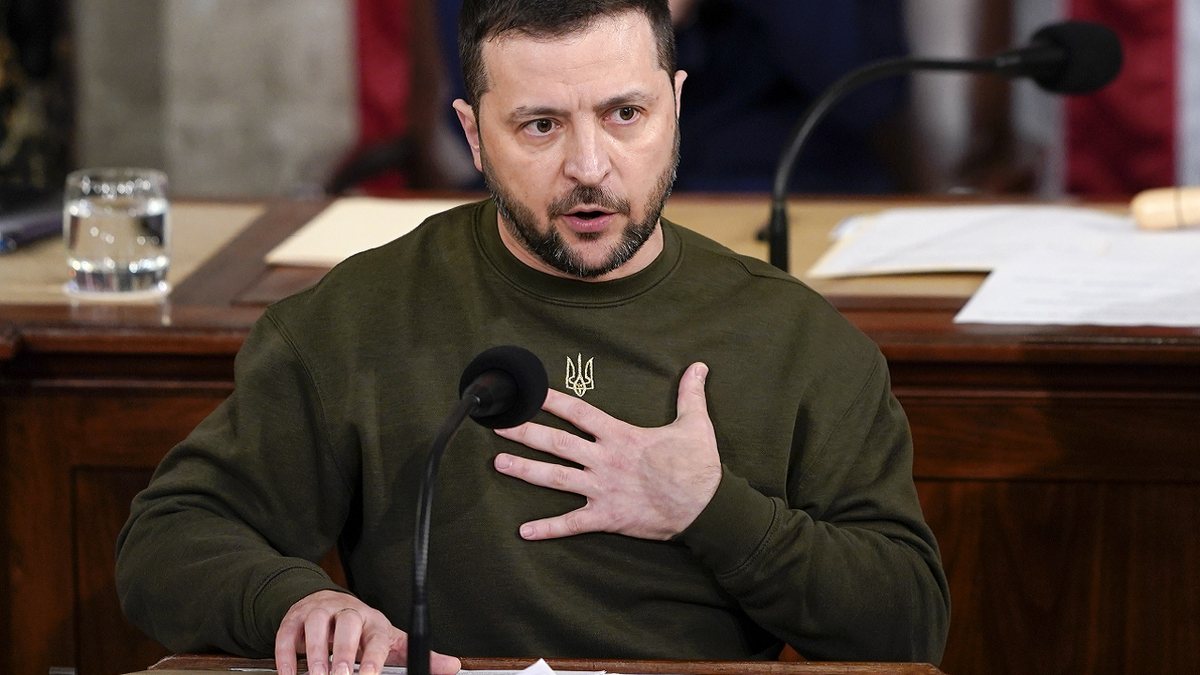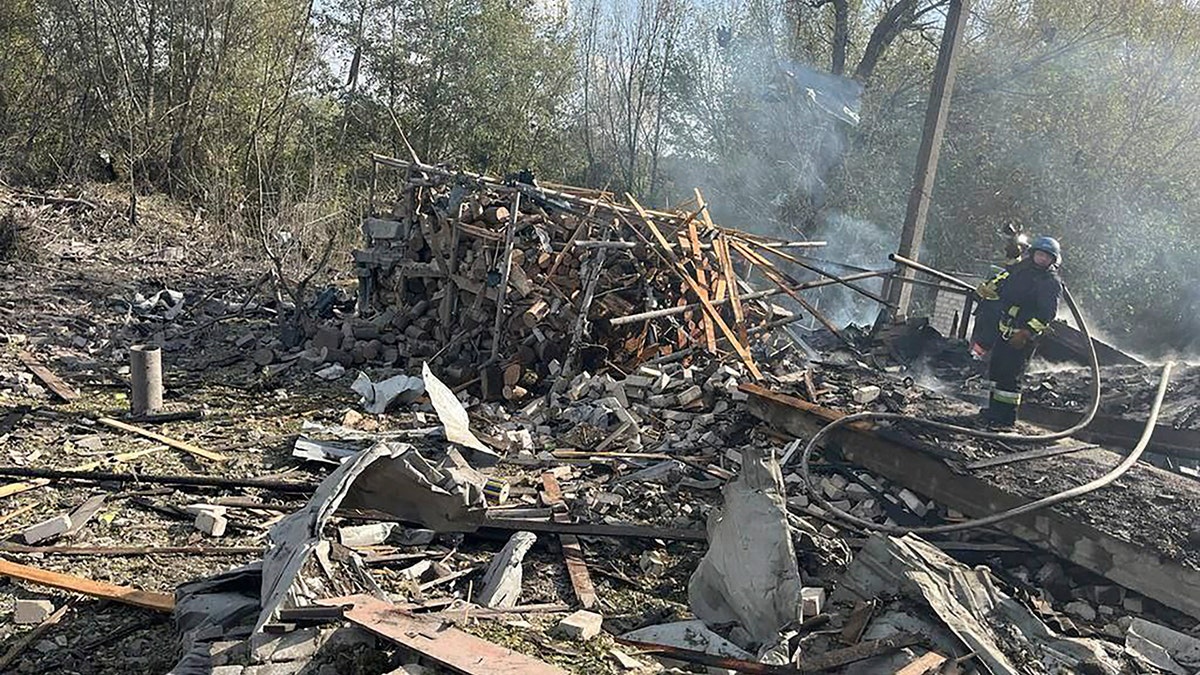Democrats want Ukraine funding included in aid package
FOX News congressional correspondent Aishah Hasnie reports on the fate of the Israel aid package after House passage on ‘Special Report.’
Since the beginning of Russia’s full-scale invasion of Ukraine, the latter has received billions of dollars of aid, with over $113 billion coming from the United States alone. President Joe Biden recently asked Congress to approve another $60 billion, and it’s almost certain that Ukraine will request more U.S. aid in the future.
When making these asks, Ukraine’s government has portrayed the defense of their homeland as a defense of global democracy. Aid is, in the words of Ukrainian President Volodymyr Zelenskyy, "not charity," but is "an investment in the global … democracy that we handled in the most responsible way."
However, in the midst of defending democracy, their government seems to have forgotten one of its central tenets: holding elections.
SPEAKER JOHNSON PUSHES TO COUPLE UKRAINE AID AND BORDER: 'TAKE CARE OF OUR OWN BORDER FIRST'
Ukraine, like any other democracy, has regularly scheduled elections for its presidency and its parliament. They were last held in 2019 and resulted in a sweeping victory for Volodymyr Zelenskyy and his Servant of the People Party.

Ukrainian President Volodymyr Zelenskyy addresses a joint meeting of Congress on Capitol Hill in Washington on Dec. 21, 2022. (AP/Carolyn Kaster)
The next parliamentary elections were scheduled for October of this year, with presidential elections coming in 2024. Or at least they were supposed to be. With the outbreak of full-scale war, the Zelenskyy administration announced martial law and therefore the cancelation of elections. And recently, Zelenskyy again slammed the door shut on the idea of holding elections just days after Ukraine’s Foreign Minister Dmytro Kuleba had seemed to re-open it.
Zelenskyy has argued that in the midst of war, not everyone would be able to cast their votes fairly, that soldiers might not be able to vote and that Ukraine did not have enough money to conduct elections. Others have pointed to the fact that the United Kingdom did not hold elections during its involvement in World War II, and that it would be wrong to hold Ukraine to higher standards.
Frankly speaking, these arguments are nonsense.
For starters, not everyone is able to cast a vote in a given election, anywhere. No election ever has a 100% turnout rate. While much of Ukraine’s population has fled to the E.U., there is absolutely no reason why they could not simply vote in Ukraine’s embassies or consulates in the countries to which they’ve fled.
While doing so in American elections is essentially impossible due to the U.S.’s state-based system, voting in embassies on election day is a standard practice for Europeans who live outside their home countries.
Soldiers would have a tougher time voting, (however, if they can send mail, they could likely send ballots). But the United States itself passed measures allowing soldiers to vote in World War II and the American Civil War, both of which were violent and intensive conflicts; there is no reason Ukraine cannot try to do the same.
Not enough money is likewise ludicrous. Zelenskyy has claimed that, if provided with $120 million, Ukraine would hold elections. But he has not made a serious ask for such cash and, frankly, with the billions Ukraine has already received in military and humanitarian aid, it is highly unlikely that he would not be able to cobble together a mere $120 million from allies.
Chaos as a defense is also nonsensical. While the chaos of war of course makes elections difficult, previously mentioned wars — from the American Civil War to World War II — were plenty chaotic.

In this photo provided by the Ukrainian Presidential Press Office, emergency workers search the victims of a Russian rocket attack that killed at least 47 people in the village of Hroza near Kharkiv, Ukraine, Thursday, Oct. 5, 2023. (Ukrainian Presidential Press Office via AP)
Countries like Israel have held regular elections for decades whilst constantly living with the threat of terror attacks. Plus, while fighting near the frontlines is of course very serious, in cities removed from the front life is going on, with shopping malls being frequented and film festivals being held.
This is not to besmirch everyday Ukrainians — they are correct to try to hold onto a semblance of normal life. But if a country can host international film festivals, it can probably host national elections.
Defenders of a lack of elections have pointed to the British government’s refusal to hold elections during World War II. Unlike the American constitution, which mandates presidential elections every four years, many parliamentary governments can be far more nebulous with election timing. And after 1935, the U.K. did not have any elections until 1945, the end of the war in Europe.
However, Britain’s government differed in one key way from Ukraine’s: it was a government of national unity. While Churchill’s conservatives had a clear majority in parliament, he invited members of all the major parties into his cabinet to form a war cabinet; Conservative, Labour and Liberal Party ministers served side-by-side during their time of national peril.
Had Ukraine opted for a similar course, a demand for elections before further aid would perhaps be of less merit. However, its government has definitively not adopted such a course. The cabinet of Prime Minister Denys Shmyhal is comprised almost totally of members of his and Zelenskyy’s party, Servant of the People, along with some independents. Leaders or representatives of the other major parties are nowhere to be found.
CLICK HERE FOR MORE FOX NEWS OPINION
Other defenses — such as the argument that Ukraine’s laws prohibit elections during martial law, or that there is no legal architecture for mail-in ballots — make no sense when one considers the fact that Servant of the People has a clear majority and can simply make new laws.
There are legal workarounds; if the opposition was needed to constitutional amendments, it is highly unlikely that they would not allow for them. If the opposition were to block amendments, then Zelenskyy could at least argue that he tried.
This is not to besmirch everyday Ukrainians — they are correct to try to hold onto a semblance of normal life. But if a country can host international film festivals, it can probably host national elections.
Why his government is flatly refusing elections is therefore something of a mystery. It is possible that the government fears that the tide could turn against them in a year. While Zelenskyy’s approval remains incredibly high, due to his courageous decision to not flee the country and his management of the war effort, another year of essentially no change in the frontline may result in opposition politicians like Petro Poroshenko (who has remained active during the conflict) attacking his government for perceived incompetence.
CLICK HERE TO GET THE FOX NEWS APP
During much of 1864, wartime President Abraham Lincoln was fairly sure he would lose that year’s election; some fortuitous events, like the capture of Atlanta, helped to turn his political fortunes.
But Lincoln still held elections. In return for further military aid, Ukraine should do the same.











































